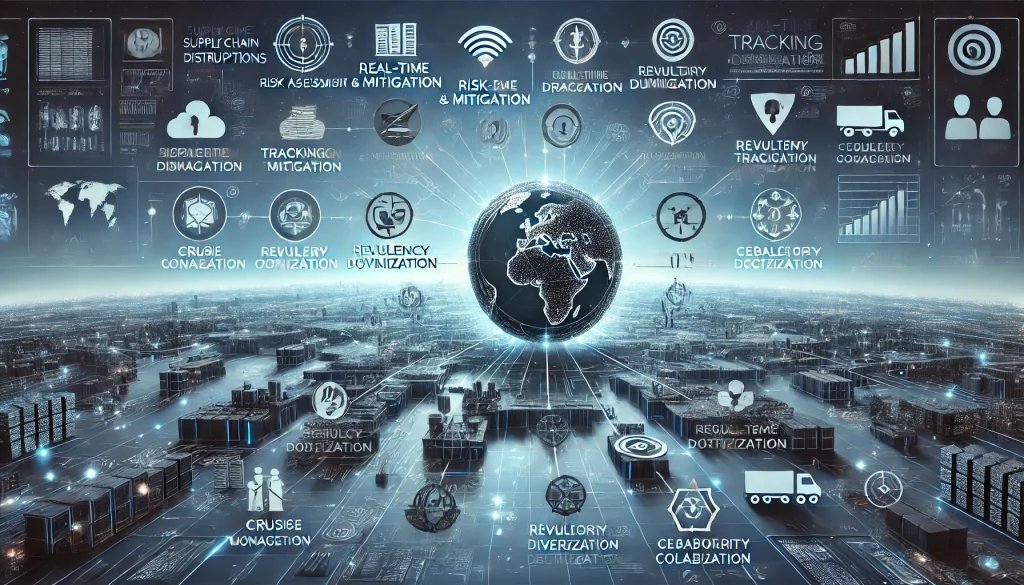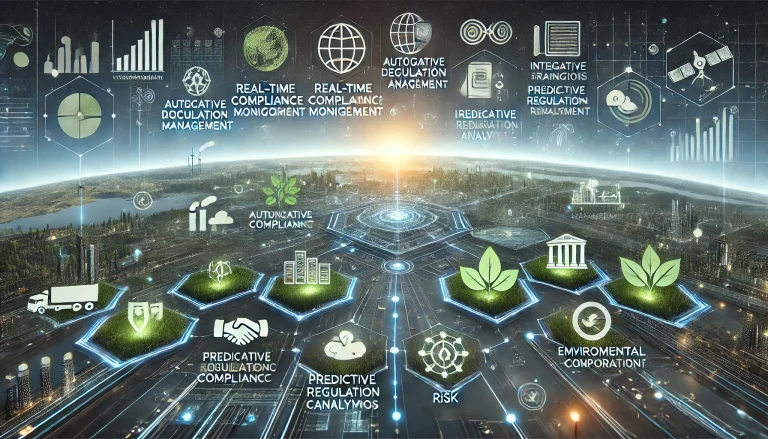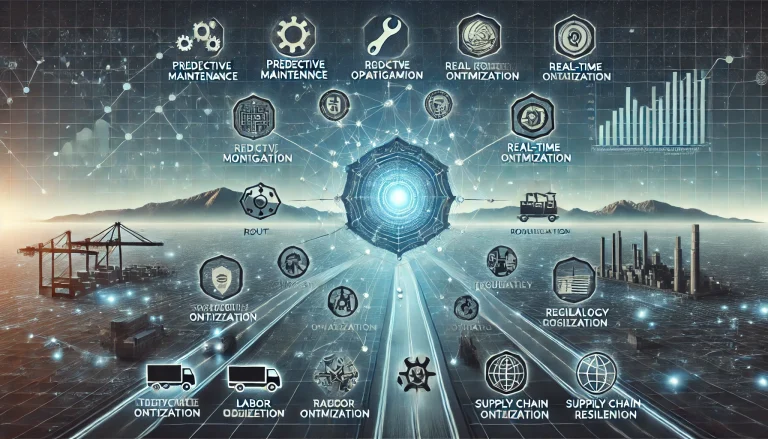Problem Statement
Global supply chains are increasingly vulnerable to disruptions caused by various factors such as natural disasters, political instability, pandemics, and other unforeseen events. These disruptions can lead to significant delays, increased costs, and inventory shortages, severely impacting businesses’ operations and profitability. To address these challenges, companies must develop resilient supply chain strategies that can mitigate risks and ensure continuity of operations.
Pain Points
- Natural Disasters: Earthquakes, hurricanes, and floods can damage infrastructure, disrupt logistics, and halt production.
- Political Instability: Tariffs, sanctions, and trade wars create uncertainties and delays in supply chains.
- Pandemics: Health crises lead to labor shortages, transportation restrictions, and supply-demand imbalances.
- Logistical Complexities: Coordinating across multiple regions and partners increases the risk of miscommunication and errors.
- Inventory Management: Inadequate inventory levels can result in stockouts or overstocking, both of which are costly.
- Supplier Reliability: Dependence on a limited number of suppliers can cause vulnerabilities if one fails to deliver.
- Cybersecurity Threats: Increasing digitization of supply chains exposes them to cyber-attacks.
- Regulatory Compliance: Constantly changing regulations can be difficult to track and comply with across different regions.
- Cost Fluctuations: Volatile costs for materials, labor, and transportation can disrupt financial planning.
- Visibility and Transparency: Lack of real-time data and insights makes it difficult to anticipate and respond to disruptions.

Future Vision
Our platform aims to revolutionize supply chain management by providing a comprehensive, resilient, and adaptable solution to mitigate risks and ensure operational continuity. Utilizing advanced technologies such as AI, blockchain, and IoT, our platform will offer real-time visibility, predictive analytics, and robust contingency planning tools. By fostering collaboration and data sharing across the supply chain network, we will enhance transparency, improve decision-making, and create a proactive approach to handling disruptions. Our vision is to empower companies to navigate uncertainties with confidence, reduce costs, and maintain steady inventory levels, ensuring business continuity and growth even in the face of unforeseen challenges.
Use Cases
- Risk Assessment and Mitigation: AI-driven models to predict potential disruptions and recommend preventive measures.
- Real-Time Tracking and Monitoring: IoT-enabled sensors for tracking shipments and monitoring conditions in real-time.
- Supplier Diversification: Tools to identify and onboard multiple reliable suppliers to mitigate dependency risks.
- Inventory Optimization: Advanced analytics for optimal inventory management, reducing stockouts and overstocking.
- Crisis Management: Dedicated modules for managing and executing contingency plans during disruptions.
- Regulatory Compliance: Automated updates and compliance checks for different regional regulations.
- Cybersecurity Measures: Enhanced security protocols to protect against cyber threats in the supply chain.
- Cost Management: Real-time cost monitoring and predictive analytics for better financial planning.
- Data-Driven Decision Making: Insights and analytics to support strategic decision-making.
- Collaboration and Communication: Platforms for seamless communication and collaboration with all supply chain stakeholders.
Target Users and Stakeholders
- User: Supply Chain Managers
- Age Group: 30-50 years
- Gender: M/F
- Usage Pattern: Daily usage for monitoring, planning, and decision-making
- Benefit: Enhanced risk mitigation, cost reduction, and operational continuity
- Stakeholders:
- Businesses: Companies relying on complex supply chains
- Suppliers: Vendors providing goods and materials
- Logistics Providers: Companies handling transportation and warehousing
- Government Agencies: Bodies regulating trade and compliance
- Investors: Entities investing in resilient supply chain solutions
Key Competition
- SAP: Offers comprehensive supply chain management solutions with real-time data and analytics.
- Oracle: Provides advanced tools for supply chain planning, logistics, and risk management.
- IBM: Utilizes AI and blockchain for supply chain visibility and optimization.
- Infor: Focuses on cloud-based supply chain solutions for various industries.
- Blue Yonder: Specializes in end-to-end supply chain planning and execution.
Products/Services
- SAP Integrated Business Planning: Real-time supply chain planning and analytics.
- Oracle SCM Cloud: Comprehensive suite for supply chain management and optimization.
- IBM Sterling Supply Chain Suite: AI and blockchain-enabled solutions for supply chain transparency.
- Infor Nexus: Cloud-based network for end-to-end supply chain visibility.
- Blue Yonder Luminate: AI-driven platform for supply chain planning and execution.
Active Startups
- FourKites: Real-time supply chain visibility and predictive analytics.
- Project44: Advanced visibility platform for logistics and transportation.
- Shipwell: End-to-end logistics management platform.
- ClearMetal: AI-driven demand and inventory management.
- Slync.io: Intelligent automation for logistics and supply chain processes.
- Resilinc: Supply chain risk management and resilience solutions.
- Vizion: Automated tracking and visibility for ocean freight.
- Flexport: Technology-enabled freight forwarding services.
- Noodle.ai: AI solutions for supply chain optimization.
- Elementum: Real-time supply chain orchestration platform.
Ongoing Work in Related Areas
- AI and Machine Learning: Enhancing predictive capabilities for risk assessment and inventory management.
- Blockchain: Improving transparency and traceability across supply chains.
- IoT: Real-time monitoring of shipments and environmental conditions.
- Robotics and Automation: Streamlining logistics and warehousing operations.
- Sustainability Initiatives: Developing eco-friendly supply chain practices.
Recent Investment
- FourKites: $100M in Series D funding led by Thomas H. Lee Partners, August 2023.
- Project44: $202M in Series E funding led by Goldman Sachs, January 2023.
- Shipwell: $35M in Series B funding led by Georgian Partners, November 2022.
- ClearMetal: Acquired by Project44 for an undisclosed amount, July 2022.
- Flexport: $935M in Series E funding led by Andreessen Horowitz, February 2023.
Market Maturity
The market for resilient supply chain solutions is maturing rapidly, driven by the increasing frequency of disruptions and the growing awareness of the need for robust risk management strategies. Companies are investing heavily in advanced technologies such as AI, blockchain, and IoT to enhance supply chain visibility and resilience. The emergence of innovative startups and substantial investments in this space indicate a dynamic and evolving market landscape poised for significant growth.
Summary
Global supply chains face vulnerabilities from various disruptions, including natural disasters, political instability, pandemics, and logistical complexities. Addressing these challenges requires resilient strategies to ensure operational continuity and mitigate risks. Our platform leverages advanced technologies like AI, blockchain, and IoT to provide real-time visibility, predictive analytics, and robust contingency planning tools. Key pain points include natural disasters, political instability, pandemics, logistical complexities, inventory management, supplier reliability, cybersecurity threats, regulatory compliance, cost fluctuations, and lack of visibility and transparency. Target users include supply chain managers and stakeholders like businesses, suppliers, logistics providers, government agencies, and investors.
Key competitors in this space include SAP, Oracle, IBM, Infor, and Blue Yonder, offering various supply chain management solutions. Active startups like FourKites, Project44, Shipwell, ClearMetal, Slync.io, Resilinc, Vizion, Flexport, Noodle.ai, and Elementum are driving innovation in supply chain resilience. Ongoing work in AI, blockchain, IoT, robotics, and sustainability is shaping the future of supply chains. Recent investments highlight the market’s maturity and growth potential, with substantial funding pouring into startups and established companies.
By addressing these pain points and leveraging advanced technologies, our platform aims to empower companies to navigate uncertainties, reduce costs, and maintain steady inventory levels, ensuring business continuity and growth even in the face of unforeseen challenges.


